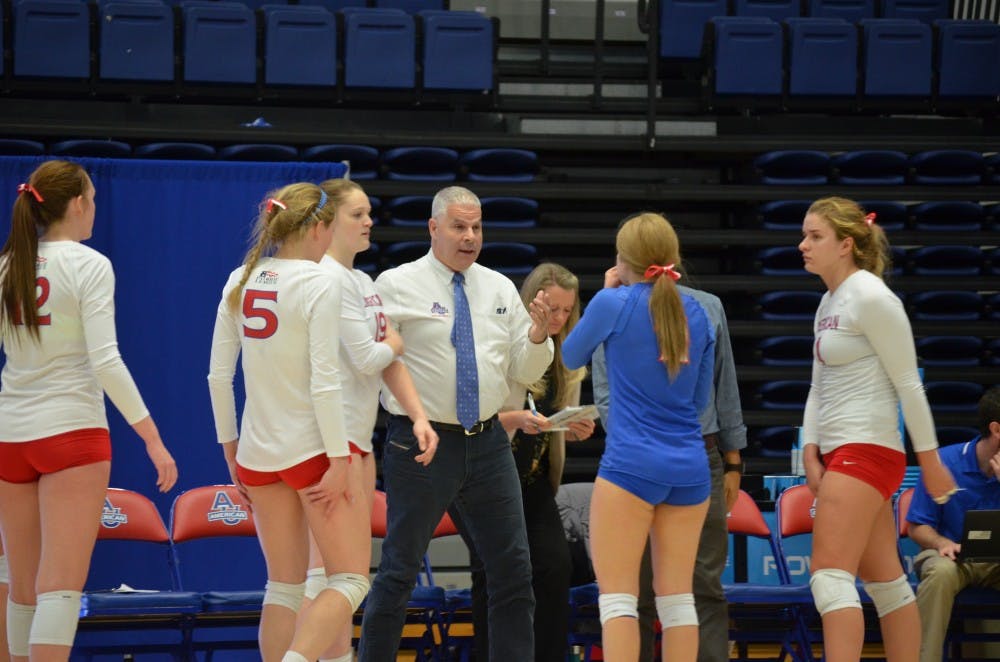While much has changed on AU’s campus in the past 28 years, one thing has remained constant: Barry Goldberg’s steady presence on the volleyball court. Goldberg’s calm demeanor, arms folded with one leg resting over the other, has become a staple on the sidelines of AU’s volleyball games.
Under Goldberg’s direction, the AU volleyball team has developed into a dynasty, winning 14 Patriot League tournament championships and losing only 14 Patriot League regular season matches in the team’s 16 years in the conference. Goldberg has also led the program to its first three NCAA tournament wins.
On Oct. 29, AU’s three-set victory over Army West Point gave the Eagles a two-game lead atop the Patriot League standings. It was also a personal milestone for Goldberg: his 700th win as head coach.
Goldberg, however, does not allow himself to think much about his personal accomplishments.
“Just another day,” Goldberg said as he reflected on the achievement. “I think a lot more about our players and what we’re doing in practices and games and taking care of the people that are around me, [it’s] much bigger than [whether] we won or we lost.”
Goldberg’s focus on those he works with can be seen on a day-to-day basis, Athletic Director Billy Walker said, and his impact on the athletic department extends far beyond the volleyball team’s performance on the court.
“He’s so successful, [but] with so many wins he’s still a humble coach that does the right thing,” Walker said. “[He] looks out for the interest of his student-athletes [to] make sure that they do the right thing to get a great education.”
Senior outside hitter Julita Kurdziuk, originally from Sejny, Poland, said Goldberg’s player-first emphasis was evident from her very first meeting with Goldberg.
“Coach came off as a family man who will take care of his players. It was very important [to me], especially for a person from abroad who was leaving her homeland to play in the U.S.,” Kurdziuk said. “It was one of the best decisions I made and playing for Coach [Goldberg] not only helped me develop as a player but, most importantly, grow as a person.”
Goldberg is one of seven Division I coaches to win 600 or more matches at a single institution. Prior to the 2016 season, he was ranked No. 22 in wins among active NCAA volleyball coaches. When Goldberg took the head coaching position at AU 28 years ago as a part-time University employee, he could scarcely imagine the success he would have with the program.
“All you’re thinking about is dealing with what is happening right now in front of [you],” Goldberg said. “Before you know it, little by little, it gets bigger.”
Path to coaching
Goldberg walked onto the volleyball team after initially being cut his freshman year at the University of Pittsburgh. Goldberg progressed from a seldom-used bench player to a starter and captain on the team that ascended to No. 12 in the nation. After Goldberg’s junior season in 1983, the university discontinued the men’s volleyball program due to budget cuts in the athletic department. Goldberg served as a player-coach for the club team during his senior year at Pittsburgh. Goldberg then served as an assistant on the Pittsburgh women’s volleyball team after completing his undergraduate work.
However, Goldberg’s dreams of coaching began earlier while still at Peabody High School in Pittsburgh, where he played volleyball for coach Joseph Silipo. Silipo, whose role and expertise extended far beyond wins and losses on the court, became a mentor to Goldberg. Despite cutting Goldberg his freshman season, Silipo got to know the young athlete from his time on the golf team and encouraged Goldberg to try out again for the volleyball team. Goldberg made the team and developed a relationship with Silipo that carried beyond Goldberg’s graduation from Peabody.
“He was the first person I went back to when I was [home from] college, [the] first one I went back to talk about what was going on and how to handle things and what my life was like,” Goldberg said. “He [was] really instrumental in encouraging me to start to look at things in a bigger picture than just my own little world.”
Heeding Silipo’s advice, Goldberg pursued coaching, and opportunities continued to open up. After completing his master’s degree in counselling education, Goldberg took a job as a drug rehabilitation counselor in D.C. while working part-time as the AU volleyball coach.
Goldberg’s success with the volleyball program was not immediate, with the Eagles failing to win the Colonial Athletic Association Championship in Goldberg’s first nine years at AU. Over time, Goldberg was able to develop a winning tradition and build a respected program that attracts players from across the globe. Walker, who first came to AU in 2013, said Goldberg’s integrity and calm manner creates an environment for his student-athletes to succeed.
“This year is a perfect example. [He’s] playing four freshman the vast majority of the time and they meshed together right away,” Walker said. “That’s because of the process he has in place and how he coaches.”
Kurdziuk said Goldberg’s process involves an emphasis on hard work among the members of the team and structured practices.
“Coach treats us like adults,” Kurziuk said. “He teaches us how to handle our business both on and off the court in a professional manner.”
While a coach’s success is often measured by wins and losses, Goldberg does not limit his definition of success to performances on the court, and instead places a higher emphasis on the impact on the individual player.
“The success is really just starting to show up as I really relate and understand more about what the players’ needs are personally,” Goldberg said. “Those measures [on an individual level] are much more important as a barometer to what your success really is.”
The ability to reach players and cultivate a better environment, Goldberg said, has come largely by self-discovery and growth.
“I can’t control how [the players] are going to take all the messages,” Goldberg said. “[Growth] has to do with me trying to become an adult myself and know what’s important in the long run scheme of things much more than the short run.”





